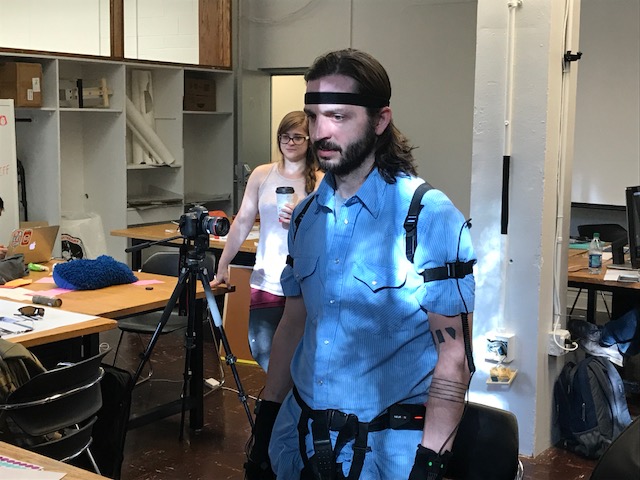Author’s note: This is an excerpt from a work in progress. It did not happen. Except for the part about a missing prostitute, a corrupt police department, and an inexplicable disparity between my forks and spoons (forks: 24, spoons: 3). Did I just not notice losing the spoons? What the fuck?
What happened?
I sit on the edge of the bed, staring at my hands. There used to be a thick callous, the size of a dime, at the base of my right index finger. Now it’s gone.
All the scrapes and cuts, the grease under my fingernails, burns on my wrists and forearms — all gone.
On the dresser, a clean pair of pants, a polo shirt (a fucking polo shirt?) and socks, solid black without a single pale-orange bleach spot.
My knife-bag is gone from the door. Instead, there’s a laptop case. There’s a stack of files – city contracts and FOIA requests – and three slim notebooks full of names and places, quotes with dates and initials.
One blessed note of familiarity: I’m hung over. So there’s that.
Also, a bizarre quirk: in the silverware drawer, a good half of the spoons are missing and there are twice as many forks as any two-person household could conceivably use.
Maybe that’s why I’ve put on twenty pounds — too many goddamn forks.
*
I’m sitting in a bottle shop downtown and there’s a young guy sitting across from me. He’s wearing a boxy suit, the kind people buy when they’re only going to wear it three times a year: weddings, funerals, and court. Today it’s court.
It’s ten-thirty in the morning, most restaurants aren’t open yet and the dives won’t open until the evening. But the bottle-shop opens early, so cops come here for a morning nightcap before they head home, pull the shades against the sun, and try to sleep. Third-shift beat cops, vice and narcotics detectives, overnight dispatch.
He holds up his pint glass, a dark ESB.
“I’m so tired of IPAs. It’s like everyone is going eight or nine fucking percent,” he says. “I drink one and I’m half drunk and I feel bloated.”
He takes a swig and sets his glass town.
“Plus I read an article, they give you man tits.”
I sigh.
“I think I read the same thing.”
This is what we talk about — craft beer culture, the threat of man tits, the weather – while we drink a beer together, and then another. He’s got to be in court in an hour. I’m technically off today, but I’m working.
Working, but not getting anywhere.
The young man wants to tell me something. It has to do with a human trafficking case that went sideways a few years ago. A prostitute went missing, a cop got shot, a police van got vandalized – lit on fire one spring morning. A lot of people got reassigned, a couple of detectives had to ride out their last years behind desks. But that was the extent of it. TV did their sixty seconds, but it didn’t have legs. It never went viral so, really, it never happened.
“No one knows how bad it was,” he says, looking at his phone, not at me.
It catches me off guard.
“How bad was it?” I ask after a moment.
“Bad,” he says. “That’s why they torched the van. Too messy to clean up.”
“They?”
He just stares into his beer. The paper I work for, it doesn’t use anonymous sources. We both know he’s not going to go on the record. We both know what that would mean for him. Worse than getting stuck with desk duty.
“I can never sleep when I go home,” he says, “unless I’ve had a few. If I sleep too long, I wake up confused, like I can’t remember what day it is. Like I’m someone else. Like I woke up in some other poor shit’s life.”
He says it like it’s a joke, but he does’t laugh.
“Go to the Times,” I tell him.
“They won’t touch it,” he says. “They don’t want to dig up old shit.”
“Why not?”
He looks at me, just shy of baleful.
So that’s it. We finish our beers. He goes to court in his boxy suit. I wash my face in the bottle shop bathroom and take a walk before driving back to the office, empty handed.
*
Some other poor shit’s life.
I think about those early mornings in the kitchen, alone. The first pot of batch of coffee percolating, the radio blaring. Peeling, dicing, julienning. Burning the inside of my forearm pulling an over-laden sheet tray out of the lower oven. Knicking off the corner of my thumbnail with a cleaver.
At noon, I’d step out back, walk into the wooded area behind the restaurant, smoke a joint, drink a mason jar of the beer I was using to braise pork-belly or short ribs.
At night, too wired to sleep, I’d sit up and write. Passable fictions, I thought. Made up stories about hard luck losers who occasionally got it right, or at least occasionally got away with it. I’d occasionally apply for other jobs, writing gigs, teaching gigs, something respectable so I could call the folks and brag a little.
I’d get my hopes up, get ’em dashed. Truth was, I was good in the kitchen, and it was starting to feel like where I was meant to be. Where I’d spend the rest of my life.
Then one day I came home, passed out on top of the covers with my greasy chef’s coat half-unbuttoned.
I woke up a year later in clean clothes, holding a reporter’s notepad to my chest.
That’s how it goes. A year passes, you don’t even recognize yourself in the mirror, but you can’t remember how it happened, when it changed.
I think about the missing girl. The years slipping away. A Ziploc bag with a bloody clump of skin and hair, in the basement of the county building. A charred police van. A defective memory card from a body cam. A strangled cry, a dull echo in the woods where no one who didn’t want to would hear it.
The fuck did I know about hard luck, or getting away with it.
*
I pull myself together, write up a local restaurant opening. I still know a lot of the local chefs, it just took a text message. Easy piece – the same old ‘farm to table’ shuck and jive, some tasteful food porn, a couple of quirky quotes from the owner.
The piece will sit nicely in the newsletter. People can only read so much crime, there’s a saturation point. But a new taco place? They’ll read it every day.
I must look like shit, because no one talks to me. I don’t mind. I file my story in peace and close my laptop.
“How’d your meeting go?” My editor asks as I’m packing up.
“It went fine.”
“He won’t talk? Or he’s full of shit?”
“One or the other. Maybe both.”
My editor nods.
“Was worth a shot,” he says. “Shame. It’d be nice to bury them.”
I shrug, pick up my laptop bag, and walk out.
Bury them. His go-to euphemism, but an odd choice when you think about it. What – in this goddamn town – wasn’t already buried?
*
My wife is drifting off to sleep but I’m still tweaking the headlines newsletter for tomorrow. She doesn’t care if I’m a line cook or an editor, she says. I believe her. I think if we’re not homeless, and I’m happy, she’ll be happy.
That’s a hell of a thing.
She rolls over.
“Are you happy?”
Who gets to be happy? is what I want to say. Maybe stoned line cooks who are working too hard, too many hours a day, to run the risk of caring about what’s going on in the city around them. Was I happy, when that was me. I take a long drink of bourbon. I can’t remember. Maybe I was.
I set the glass down with a thud. She looks at the glass, at me.
“We can leave, get away from this. We could leave tomorrow. Go to the mountains. We could sell the car. Move to Iceland,” she says. “What do we really need? You and me.”
I lean over and kiss her.
“I’m serious. I’ll follow you anywhere, “she says.
She rolls over, turns off the lamp on her side of the bed. I stare at the newsletter layout, willing the typos and dead links to show themselves. They don’t. Instead, the screen starts to swim. Too much to drink. I set my alarm for six; I’ll fix it in the morning.
I turn off my lamp, try to tuck my body tightly against my wife’s. She takes my arm and holds it against her.
She knows we can’t leave. Or, rather, she knows I won’t leave. But she doesn’t say it. She kisses the knuckles on my hand and laughs quietly.
“I wish I knew what happened to our fucking spoons,” she says quietly.





 t Sloppy died, drowned in a weeklong deluge. We had, over the the year, earned her trust. Brought her from her nervous perch in the forest to the edge of our kitchen, fed her, and even petted her, once or twice. But Sloppy was a wild animal and would not – perhaps could not – be changed. She came as close as she did to teach her sole surviving kitten that we could be trusted. Her kitten – Biscuits – was trusting and friendly, allowing us to pick him up, play with him, take him to the vet, and eventually our baker adopted him.
t Sloppy died, drowned in a weeklong deluge. We had, over the the year, earned her trust. Brought her from her nervous perch in the forest to the edge of our kitchen, fed her, and even petted her, once or twice. But Sloppy was a wild animal and would not – perhaps could not – be changed. She came as close as she did to teach her sole surviving kitten that we could be trusted. Her kitten – Biscuits – was trusting and friendly, allowing us to pick him up, play with him, take him to the vet, and eventually our baker adopted him.